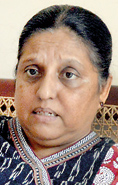News
Sex in the city: Legalise or not?
As the controversy over the government’s decision to introduce a casino zone in Colombo rages on, a government minister yesterday ruled out the possibility of legalising the sex trade in the face of calls from a section of womens’ rights activists who believe the casino boom would increase prostitution in the country.
Child Development and Women’s Affairs Minister Tissa Karaliyadda told the Sunday Times legalising the sex trade would be an insult to women in the country.
“We don’t want to bring in laws that will be offensive to our women. What we can do for those already involved in sex work is to take them to the right path rather than bring a law that would increase the number of sex workers,” the minister said.
Answering a question on whether the new casino zone would not increase sex trade in the country he said it wouldn’t be an issue for women. “I don’t know if new casinos will be brought in but it wouldn’t change the situation, we already have casinos in our country and it doesn’t mean that we have many sex workers. Just because some people ask for its legalisation we can’t let our women get involved in such offensive work,” he added.
Children and women’s Bureau Director SSP Senarath Padmalal Sadungahawatte said the issue should be studied carefully before steps are taken to legalise the trade or amend the present laws pertaining to it. He said since we live in a multi-cultural society it was important to understand the sensitivities of each community.
SSP Sadungahawatte added that Sri Lanka already had an existing law pertaining to sex and that it somewhat curbed the number of women involved in the industry. Dr. Neela Gunasekara chairperson of the National Committee on Women said their movement was against legalising the trade as it would not solve the problems faced by women.
“I think legalising it would only allow culprits to engage in activities they fancied. This should not happen in a country like ours that has adopted Buddhist values,” she opined adding that the fact that commercial sex was currently illegal had prevented rural youth from falling pray to such activities, in the guise of earning money.

Dr. Nimalka Fernando
“We use the existing law as a tool to maintain discipline among the youth,” she added. Former CID DIG Jayantha Kulathilake also said he believed legalising the sex trade in the country would cause more problems in society. Legalising it for the sake of tourism was a baseless argument, he added.
He also said legalising sex work, which was more a western outlook, will go against the beliefs of a large portion of the local population. On the religious front the Sunday Times spoke to the Bodu Bala Sena, that has been silent over the raging casino issue. Its General Secretary Ven. Galaboda Aththe Gnanasara Thera said the government should not focus on bringing in new laws but strengthen the existing ones that illegalises sex trade.
“Some complain that when casinos are brought into the country the sex trade will gradually increase. I don’t understand this argument. These casinos are only for foreigners and locals are not allowed to go into them. If there is such a restriction are they going to fly into the casinos?” he asked.
Opposing all these arguments Project Director of International Movement Against all form of Discrimination and Racism Asia Committee, Women’s Political Academy Sri Lanka, Dr. Nimalka Fernando said it was important that the government legalised sex trade if it was going to bring in more casinos.
“The backdrop for the debate has arisen in the context of the government affirming a position that they are going to introduce laws to encourage investors in order to develop a booming leisure industry which is linked to tourism promotion. If it is serious about bringing in casinos it should also be mindful of the fact that women are going to face a violent situation in this industry,” she said adding that more casinos would mean a rise in the demand for sex trade.
“Women are being harassed under the Vagrants Ordinance Act. Women involved in the trade are criminalised. Without condemning this profession the government should first provide productive alternate employment for the women,” she said.
Explaining further Ms. Fernando said amendments should be brought into the Brothel Ordinance and Prostitution Ordinance so that women are not criminalised. The country should adopt liberal attitudes towards sex work or deal with the consequences women experience. She added that the matter should be approached in a rational manner.
Stating that it was an exaggeration to say that women would queue when the industry was legalised she said most women who entered the trade made a conscious decision. “It is sad that most people preach only about the women and not about the men in our society. I believe people who don’t know anything about the subject should refrain from commenting on it.”
Meanwhile Kumudini Samuel of Women and Media Collective said the main question here was how to safeguard women. Stating that it was necessary to accept that sex trade existed in society she said, “we must not look at it from a moral point of view. It should be to reduce violence against women and the prevalence of sexually transmitted diseases,” she said.
Former Vice Chancellor of Colombo University, Prof. Savithri Gunasekera, a member of the United Nations Committee of Convention on Women, said the issue to legalise or not to legalise the sex trade was a complex one that needed to be studied thoroughly. She said that the present law was used unfairly against prostitutes and amendments should be introduced.
comments powered by Disqus
